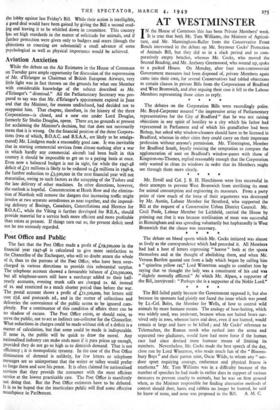Post Office and Public
The fact that the Post Office made a profit of L19,500,000 in the financial year 1947-48 is calculated to give more satisfaction to the Chancellor of the Exchequer, who will no doubt annex the whole of it, than to the patrons of the Post Office, who have been over- charged in various directions to provide this substantial surplus. The telephone account showed a favourable balance of £ro,soo,000, but all telephone-users still have a surcharge added to their half- yearly accounts, evening trunk calls are charged Is. 6d. instead of rs. and restricted to a much shorter period than before the war. The postal account shows a profit of L11,500,000, but letters still cost 21(1. and postcards 2d., and in the matter of collections and deliveries the convenience of the public seems to be ignored com- pletely. For a continuance of this condition of affairs there can be no shadow of excuse. The Post Office exists, or should exist, to serve the public, not to act as indirect tax-collector for the Chancellor. What reductions in charges could be made without risk of a deficit is a matter of calculation, but that some could be made is indisputable. If none is, the public will be quick to draw the moral. Any nationalised industry can make ends meet if it puts prices up enough, provided they do not go so high as to diminish demand. That is not efficiency ; it is monopolistic tyranny. In the case of the Post Office diminution of demand is unlikely, for few letters or telephone messages are so unimportant that the writer or talker would prefer to forgo them and save his pence. It is often claimed for nationalised services that they provide the consumer with the most efficient service at the lowest practicable rate. The Post Office is manifestly not doing that. But the Post Office estimates have to be debated. It is to be hoped that the inarticulate public will find some effective mouthpiece in Parlitiment.






































 Previous page
Previous page